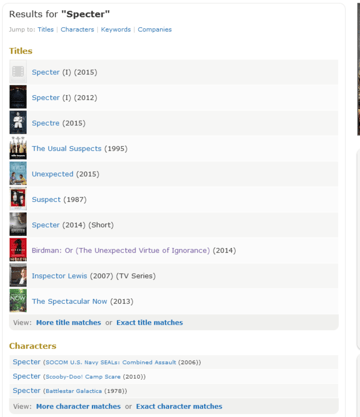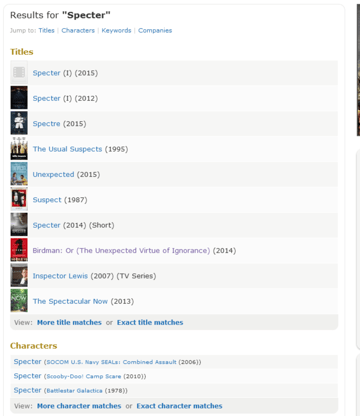Implementing Fuzzy search in SQL server
What is it?
Fuzzy Search is the process to locate records that are relevant to a search, even when the search criteria doesn't match. Fuzzy Searches are used to:- Suggest the correct spelling of a word ("Did you mean this...").
- Find results related to your search term ("You might also like...").
- Finding synonyms for search terms (Search for Dog and also get results for Puppies and Pets).
- Probably other things...
What does it fix?
As suggested above, Fuzzy Search logic is great for when you or the users don't know the exact term they're looking for. For example, let's say I want to find the latest James Bond movie, but only vaguely know its name. An IMDB search for "Specter" brings up the James Bond "Spectre" movie as a suggestion today. If you actually search for the term, you'll get a wide variety of increasingly weird results (And also the right answer!). I don't have access to the IMDB code, but I believe they're using a combination of the Levenshtein Distance, Trigrams, and maybe Double Metaphones. Coincidentally, those are exactly what we're covering here. [caption id="attachment_81169" align="alignnone" width="360"]
Fuzzy search in SQL server
Before implementing Fuzzy Search in SQL Server, I'm going to define what each function does. As you'll see, they are all complementary to each other and can be used together to return a wide range of results that would be missed with traditional queries or even just one of these functions. The three functions we're going to look at are:- Levenshtein Distance
- Trigrams
- Double Metaphones
Levenshtein distance
The Levenshtein Distance is a calculation of how different two strings are, and it's expressed as the number of steps required to make StringA look like StringB. The steps are counted in terms of Inserts, Updates, and Deletes of individual letters in the two words being compared. This is good for short strings where not many differences are expected, AKA misspelled words.
A simple example is the word Car to Date. The Levenshtein Distance here is 3, and we get there by: Step 1: UPDATE 'C' to 'D' Step 2: UPDATE 'r' to 't' Step 3: APPEND 'e' So, in the IMDB example, my search for "Specter" has a Levenshtein Distance of 2 from "Spectre". Again, we get there by: STEP 1: UPDATE 'r' to 'e' STEP 2: UPDATE 'e' to 'r' There is also the Damerau-Levenshtein Distance. This is built on the Levenshtein Distance, but accounts for transpositions of letters right next to each other. That would have returned a value of 1 with this logic: STEP 1: Flip 'r' and 'e'
Trigrams
Trigrams are used to find matching sets of words or characters in words or phrases. As the name implies, each Trigram is a set of 3 characters or words, and you simply count how many trigrams in each string match the other string's trigrams to get a number. These are great for comparing phrases. An easy example is to compare a search for "SQL Server" to "SQL Sever": STEP 1: Break 'SQL Server' up into trigrams 'SQL', 'QL ', 'L S', ' Se', 'Ser', 'erv', 'rve', 'ver' STEP 2: Break 'SQL Sever' up into trigrams 'SQL', 'QL ', 'L S', ' Se', 'Sev', 'eve', 'ver' STEP 3: Count the number of trigrams that match: 5 A matching set of 5 trigrams might mean these are close enough for the application to suggest as an alternative. Another example is comparing the phrase "Oracle" to "Relational Database Management System". STEP 1: Break 'Oracle' up into trigrams 'Ora', 'rac', 'acl', 'cle' STEP 2: Break 'Relational Database Management System' into trigrams 'Rel', 'ela', 'lat', 'ati', 'ona', 'nal', 'al_', 'l_D', ..., 'tem' STEP 3: Count the number of trigrams that match between them: 0 As you can see, Oracle isn't very close to being an RDBMS at all. Finally, in our IMDB example, you can see that the movie Unexpected was returned. Why? I don't actually know, but I believe it's because there are several matching trigrams between "Specter" and "Unexpected" which pushed it into the possible suggestions. [caption id="attachment_81169" align="alignnone" width="360"]
I don't like scrolling up.
Double metaphone
Double Metaphones are the updated version of the SOUNDEX() function. Updated as in soundex was first patented in 1918, and double metaphones are from the 1990's. They both work the same by breaking up consonants into what they sound like and comparing them to the closest matching values; however, soundex assumes each consonant has the same pronunciation, while metaphones allow for multiple pronunciations of the same word.
Double Metaphones are geared towards names: The first example is one where SOUNDEX and a Double Metaphone work identically. The name "Bruce" and it's common(?) misspelling "Broos". STEP 1: SELECT SOUNDEX('Broos') and we get B620 STEP 2: SELECT SOUNDEX('Bruce') and we get B620 STEP 3: Use an online calculator to get the Metaphone values for Broos and Bruce Both return 'PRS' and 'PRS' The benefit of the Double Metaphone here is that, because the results for both words are the same, you can have a higher level of confidence that this is a misspelling. Another example is "Smith" and "Schmidt". STEP 1: SELECT SOUNDEX('smith') and we get S530 STEP 2: SELECT SOUNDEX('schmidt') and we get S530 STEP 3: Use an online calculator to get the Metaphone values for Smith and Schmidt The most common pronunciation is first: Smith yields 'SM0' and 'XMT' Schmidt yields 'XMT' and'SMT'
Using the SOUNDEX() function, you might return this "Smith" as a misspelling of "Schmidt", which is unlikely. On the other hand, using a double metaphone function, you would know that while these two words are occasionally pronounced identically they more frequently not pronounced the same, and you could either discard the result or push it to the bottom of your suggestions. If you do pronounce any of these words the same, here's a website to compare the expected English pronunciations. In my next post, I'll implement each of these as CLRs in C# code. I'll also point out some nice T-SQL implementations I've found and compare performance.
Discover more about our expertise in SQL Server.
SQL Server Database Consulting Services
Ready to future-proof your SQL Server investment?
Share this
Share this
More resources
Learn more about Pythian by reading the following blogs and articles.

Removing SQL Reporting Services instances from scale out deployment

How to Install SQL Server Reporting Services 2019

Improving Backup efficiency on SQL Server 2025 with the new ZSTD algorithm
Ready to unlock value from your data?
With Pythian, you can accomplish your data transformation goals and more.


